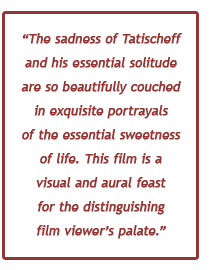 Film: The Illusionist (Sony Pictures Classics 2010)
Film: The Illusionist (Sony Pictures Classics 2010)
Director: Sylvain Chomet
Original Script: Jacques Tati (adapted by Sylvain Chomet)
Genre: Animated
?Writers and people who had command of words were respected and feared as people who manipulated magic. In latter times I think that artists and writers have allowed themselves to be sold down the river. They have accepted the prevailing belief that art and writing are merely forms of entertainment. they’re not seen as transformative forces that can change a human being; that can change a society . . . It’s not the job of the artist to give the audience what the audience wants. If the audience knew what they needed, then they wouldn’t be the audience. They would be the artists. It is the job of artists to give the audience what they need.?
Alan Moore
The Magic of Magic Dispelled: Portrait of the Artist as a Travelling Magician
Tatischeff, a has-been magician, is performing his tired magic act at a hall in Paris. Big in the small time and small in the big time, he shares the stage with a number of disparate acts. He’s ordered to fill in for the aptly named Billy Boy and the Britoons, who are a tad late, so he continues to try to come up with new tricks for an increasingly hostile crowd until at last the rockers arrive and he’s hustled out.
The fans scream as the Roxy Music clones belt out their ballads and go into contortions designed to make young girls wiggle and squirm (despite the fact that, as we discover backstage, girls really aren’t their cup of tea). Tatischeff must close the show, but then the curtain rises to reveal naught but a grandma and her bespectacled grandson in the audience. The boy makes it clear that he knows exactly how the tricks are accomplished and tries to tell Grandma, who quickly hushes him up.
Real magic entails a manipulation of natural forces by means of forbidden (at least forbidden by organized religion) power. Tatischeff’s magic only tries to recreate the sense of wonder experienced by our simpler selves when we first witness the unexpected.
At one other venue he meets an amiable drunken Scotsman whose pure pleasure in life is something admirable in itself, even if he is a tippler. This bare-bottomed, kilted, loving, atavistic, bon vivant makes no snobbish distinctions in his joyful consumption of the entertainment arts; rock n? roll is to be revelled in as much as his traditional Highland dancing, or even Tatischeff’s tricks.
I love this Scotsman more than anyone else in the film. He doesn’t ask the magic to be real, but wants only to be delighted by it. He represents half of an artist’s followers?the ones who simply love you and all that you do, who revel in your performances, who adore you unconditionally, and who hold none of your faults against you. This type of consumer can be very uplifting and encouraging in a line of work that needs big shoulders. On the other hand it can tempt you to vice and a lack of self-discipline.
The rest of your followers truly believe that what you are doing is magic and not sleight of hand. This group spurs you on to greater and greater feats and demands more and more, but eventually becomes distracted by reality and wanders off after someone else who promises more magic. Thus you have worked yourself to death for nothing.
This sector is represented by the Gaelic-crooning Alice, the poor little drudge of a girl who cleans the rooms at the pub on the Hebrides island where Tatischeff is staying. The Scotsman has brought him there to help celebrate the arrival of electricity on the island.
When Tatischeff makes Alice’s soap bigger she is amazed, and immediately puts all her faith in him. She then appears on the boat that takes him back to the mainland and expects him to magically produce a ticket for her.
What can he do? Alice becomes his unofficial ward. To humour her, or perhaps because her admiration is a salve to his oft-wounded ego, he continues to knock himself out to keep her illusion alive, even at the cost of his own health.
After all, isn’t this why he became a magician? To create illusions?
Alice is not unlike those who believe that artistic creation is just play, yet have no idea that many of us go without and often work at menial jobs in order to be able to go on providing them with the illusions that buoy them up.
The sadness of Tatischeff and his essential solitude are so beautifully couched in exquisite portrayals of the essential sweetness of life. This film is a visual and aural feast for the distinguishing film viewer’s palate.
The Illusionist fulfills eleven of the Mindful Bard’s criteria for films well worth seeing: 1) it is authentic, original, and delightful; 2) it poses and admirably responds to questions that have a direct bearing on my view of existence; 3) it stimulates my mind; 4) it harmoniously unites art with social action, saving me from both seclusion in an ivory tower and slavery to someone else’s political agenda; 5) it provides respite from a sick and cruel world, a respite enabling me to renew myself for a return to mindful artistic endeavour; 6) it is about attainment of the true self; 7) it inspires an awareness of the sanctity of creation; 8) it displays an engagement with and compassionate response to suffering; 9) it makes me want to be a better artist; 10) it gives me tools of compassion, enabling me to respond with compassion and efficacy to the suffering around me; and 11) it makes me appreciate that life is a complex and rare phenomenon, making living a unique opportunity.


